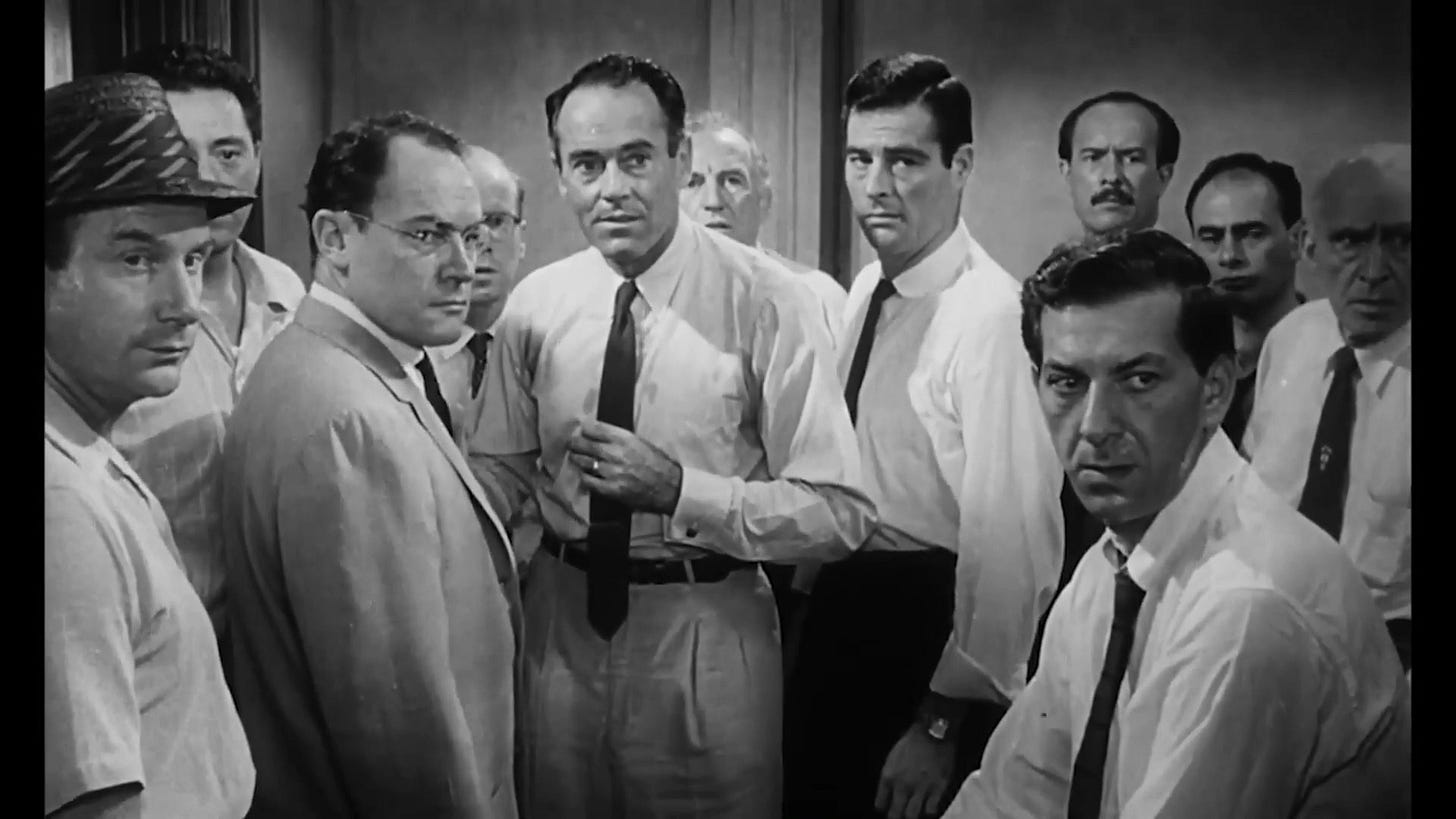‘Stay here and talk it out’
#29 - ‘12 Angry Men’
12 Angry Men is ostensibly an intellectual exercise in film-viewing. Alongside the men weighing the guilt or innocence of a poor, 18-year-old boy accused of murdering his father, we are meant to consider the defining phrase of our criminal justice system: “a reasonable doubt.”
And consider it we do in almost excruciating detail for almost the entirety of the film’s 97-minute runtime. In parallel, we are not just considering the definition of those words, but what it means to engage with them as responsible citizens in a democracy.
Very early on in the film, we learn that Juror 7, played by the great Jack Warden, wants to get to that evening’s Yankees game. This seems to be driving his casual, expedient view of the accused’s guilt or innocence. It’s not that he’s flipping a coin to decide where he stands, it’s just that he has places to be and a re-examining of facts that seem to paint a clear picture anyway are just getting in the way of him moving on with his life.
The approach of Warden’s Juror 7 to justice is the key contrast to Henry Fonda’s Juror 8, though not the starkest. As Fonda, the lone “not guilty” holdout on the panel at the film’s outset, exhorts his peers to go through the facts methodically, he faces even stiffer resistance than from Warden.
But Warden’s cavalier attitude to a life-and-death matter is the most pervasive and dangerous one to the ideals of our legal system. Other jurors have more clear biases, but Warden’s overarching view is the one that can be swung one way or the other. And, curiously, even though Juror 8 is able to sway Juror 7 to his side by the end of the film, it’s not clear that his character’s overall attitude has changed. Juror 8 may have prevailed in this round, but the next day, perhaps in the very same room, there will be another round, another Juror 7 and Juror 8.
This sentinel-like approach to engaged citizenry is the deeper lesson to be learned from 12 Angry Men. It is not that we need to better educate the public about what we mean when we talk about the phrase “beyond a reasonable doubt.” It is that we must steel ourselves for constantly having to defend both its purpose and the time and energy it takes to see it through properly.
As intellectual an exercise as 12 Angry Men is, it is also a clearly visceral one, a trial of physicality and endurance. Director Sidney Lumet and cinematographer Boris Kaufman engage the senses as much as the mind from the very start. There are close-up shots of the jurors and a constant swiveling motion of the camera as it moves from speaker to speaker to speaker weighing the fate of the defendant.
There is the claustrophobia of the room where the jurors deliberate, a function of the confined space, yes, but also of the humid conditions - Fonda and everyone else dabs sweat from their brow repeatedly - and, near the film’s climax, there is a rainstorm that requires quick action. Close the windows before you’re soaked, and carry on with the deliberations in what one must imagine is an even stuffier, tighter setting.
This is hard work. The laboriousness of weighing a fellow citizen’s guilt or innocence ought to be as physical as it is mental. To not acknowledge this is to align yourself with the likes of Juror 7 and not Juror 8. It is to place our self-interest ahead of what we owe each other. It is active. What other word is there to give the actions of Fonda’s Juror 8, a man who does a better job of trying the case than the defendant’s own counsel.
There are plenty of great films that use the justice system to ponder the nature of truth. 12 Angry Men doesn’t entirely gloss over this subject. Indeed, there are some inconvenient truths whether you think the defendant is guilty or innocent in this case.
But it is so much more a film about our responsibility to each other in a civil society - what we would hope a jury of our peers would do if we were in the chair of the accused, and how we know some of our peers would actually behave, despite what is ethical and moral. We know Juror 7 is likely to be lurking in this hypothetical. We can only hope Juror 8 is right there alongside him or her.



